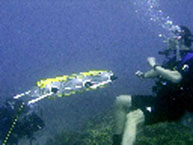Robot at home on land, sea
Coral reefs are home to an abundance of different species, but visitors to Barbados last month may have witnessed a creature absent from any of the regular organism identification books.

Chris Prahacs (BEng'02), one of the AQUA's original designers, puts his robotic progeny through its paces.
Courtesy of AQUA project
The new mystery creature is McGill's own AQUA, - a silver, six-legged robot that looks more like an over-sized fax machine or scanner than a member of the marine environment.
But looks can be deceiving. AQUA, - the world's first amphibious robot,- is as much at home in the ocean as it is on dry land, and that makes it truly unique, according to Dr. Greg Dudek of McGill's Centre for Intelligent Machines (CIM)."There are robots that can swim and there are robots that can walk, but AQUA is the first robot capable of doing both," Dudek said.
The uses of such a versatile machine are numerous, ranging from ocean exploration to diver rescue, but Dudek and the AQUA research team, which includes scientists at York and Dalhousie universities, have their sights set on much greener visions. They plan to turn AQUA into a marine biologist with the help of McGill biologist Don Kramer and his PhD student Katherine Turgeon.
Coral reefs are under threat from a plethora of environmental insults, ranging from local pollution to global warming.
"Marine biologists spend many hours underwater assessing the health of coral reefs," Dudek said. "We realized that AQUA had great potential to assist with this kind of environmental monitoring."
AQUA can dive deeper than most scuba divers, will not run out of air and does not get cold or tired.
When assessing coral reefs, it is particularly important to ensure that disturbance to the marine environment is minimal. Research divers must control their movements and even their breathing so they don't disturb the organisms they are trying to record.
"Contemporary aquatic robots are equipped with thrusters, which work well for controlling movement," said Chris Prahacs, one of AQUA's original designers. "But thrusters also stir up sediment, which reduces visibility and can disturb coral reef life."
Flippers on its six walking limbs give AQUA unparalleled maneuverability in the water and allow the robot to hover and move underwater without kicking up sediment.
"Visually, AQUA could be described as a turtle with six flippers instead of four," said Prahacs, who also worked on -AQUA's land-locked predecessor. Unlike turtles, which have existed in much the same form since the Mesozoic era, AQUA has continued to evolve into successively more capable and intelligent robots.
Last month, AQUA was kicking its fins at Bellairs Research Institute,- the same location it has been visiting every January for the past four years. This year's trip pushed AQUA to new extremes of performance, including depth testing to 120 feet, reef mapping without disturbing the environment and even basic sign language.
"The ability to program AQUA visually underwater is an important feature of working in this environment," Dudek said. "Divers communicate using hand signs and we wanted to develop a similar system for AQUA." The signals that AQUA can understand range from "Follow me and record video," to "Diver in trouble,- go get help."
It's easy to see how those who work underwater would be happy that AQUA has come along. The initial results of the Barbados testing suggest the team is one fin kick closer to their dream of creating a marine biologist.
There's still a long way to go, but by all accounts AQUA has performed at least well enough to be rewarded with another trip to Barbados next winter.

